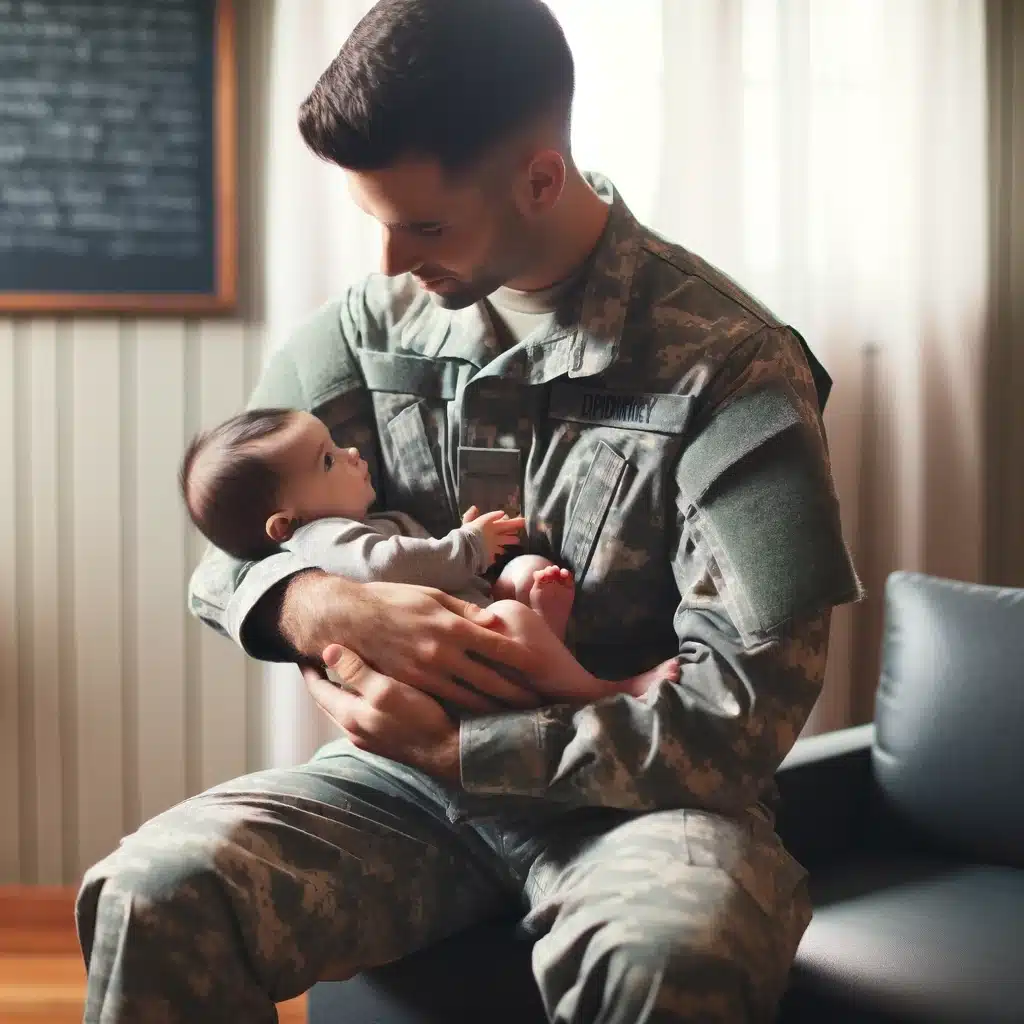Adoption is one of the most noble and loving acts that a family can engage in. When you and your spouse decide to adopt a child that means that you are willing to grow your family in a fairly unique way. Adopting a child means taking on the unknown as far as what challenges the child will offer your family. However, those challenges pale in comparison to the positive impact that an adopted child will have on your entire family. Having adoption consultants and an experienced adoption attorney by your side makes navigating the adoption process achievable despite its complexities.

Supporting Military Adoption
Active-duty military members considering adoption deserve special commendation. Taking on the sacrifices that you and your family have is impressive in and of itself. On top of that, to show the sort of love to another person that you would consider adopting him or she speaks to the kind of person that you are. While it is an exciting time to be during an adoption that does not mean that the process will not be challenging. The Department of Defense and your military branch provide assistance and support, yet there are essential aspects of the adoption process you should understand before proceeding.
When you take on the responsibility of adopting a child you do so knowing that the adoption timeline can extend out several months to even taking a year or more. Adopting a child incurs costs that may compound the daily stresses of military service. On the other hand, there are joys and love associated with being a parent that are obvious plusses when it comes to going through an adoption. Your military status may raise concerns about your eligibility as an adoptive parent. However, in most cases, it should not hinder the process of having a child placed with you.
Exploring Different Adoption Methods
The first place that you should start learning about once you decide to adopt a child is to learn as much as you can about the different types of adoption cases. You can work to adopt a child through an adoption agency or adopt a child independently by contacting a birth mother and developing a relationship with her. You may also choose to use a hybrid of the agency and independent adoption. This means that you and the birth family could choose to work together on an adoption using an agency as your intermediary or representatives during the case itself.

International adoption is a well-known route that parents may choose to take when it comes to adding a new member to their family. Several adoption agencies specialize in assisting Americans with international adoptions. In an open adoption the birth family, child, and adoptive family talk before the adoption. Finally, you can raise a child as a foster parent and then work to adopt him or her. After careful consideration, you can determine the best option for you and your current life circumstances.
Where you are going to live in the next few years is also going to be very important when it comes to determining all the details of the adoption process for you and your possible new family members. Transitioning to a new location for active duty in the next few months can complicate the adoption process to a certain degree. While moving may not spell the end of the world for your adoption, it can necessitate revisiting some steps already completed. If you find yourself going overseas, the entire adoption process would likely be put on hold.
International Adoption Challenges for Military Members
Finding yourself in a situation where you are going to be living in another county because of your military service is something that many people don’t consider as they begin an adoption as a military member. There are adoption agencies that specialize in helping American citizens who are living in other countries. Living in another country can complicate the criminal background search process. It’s essential to avoid unnecessary delays in your adoption process due to incomplete steps. Living in another country we’ll certainly not make the process more efficient for you or your adopted child.
Living in another country can complicate the adoption process due to potential travel requirements involved. While you may have some degree of travel flexibility because of your military service it is more likely than not that you cannot choose exactly when you get to leave wherever you are living right now. Your military obligations may restrict your ability to travel at certain predetermined times. You should certainly discuss this with the adoption agency that is partnering with you as early as possible. That way there are no surprises in the future when it comes to planning out dates where you need to travel to and from the country where you are living right now.
Financial Support for Military Adoption
The cost of adoption poses a challenge, but as an active-duty military member, you can receive reimbursement for certain expenses associated with the process. Contact your military representative to inquire about available benefits and reimbursements. Upon adopting a child, you are entitled to 12 weeks of parental leave, allowing you time to care for your growing family.
Probably the most considerable concern as far as costs are concerned that people tend to have when a child comes into their lives is health insurance. Your military health insurance automatically covers your adopted child. However, after a specific period, you will need to turn in an enrollment application for your child to keep your coverage for him or her current. This is true whether you are adopting a child or fostering a child. There are also adoption tax credits that may be available to you. In some cases, the tax credit may even be able to cover all the costs of the adoption process.
Resources and Assistance Available
Military, active-duty service should not be something that by itself holds you back from trying to adopt a child. The military branches offer support and assistance for you and your growing family. This is a great benefit for you all who may be searching for answers at a time when you have a lot of questions. The Law Office of Bryan Fagan is another resource for you. Whether it is you or your spouse, we welcome you to arrange a free-of-charge consultation with one of our family law attorneys. We pride ourselves on being advocates who care for our clients. Talk with us today about the adoption process and the different options that may be available to you and your family.
Guidance and Support for Divorcees
While it can sometimes feel like a different set of rules apply for your military family versus civilian families, when it comes to a divorce the adoption process is the same for everyone no matter their status as far as active duty is concerned. Where the adoption process can differ is whether you are stationed in the United States or abroad. In either situation, the military offers you adoption consultants that can help you learn more information about issues specific to your circumstances. These folks can help you to locate an adoption agency that can assist you with the adoption and can point you toward resources and financial help that will assist you in controlling the costs of your adoption as much as possible.
If you are stationed in the United States, you’ll need to determine if you are adopting a child from a different state than your current residence. If so, you must familiarize yourself with the Interstate Compact on the Placement of Children (ICPC). When stationed overseas and pursuing adoption, your state of legal residence will dictate if the ICPC applies. Additionally, a thorough home study is required for you and your family during the adoption process, a step often overlooked. With that said, we are going to spend some time discussing the home study phase of adoption and what it can mean to your growing family.
Demystifying the Adoption Home Study Process
Before being considered as an adoptive family, you will need to undergo a home study. Many people discover that the actual home study is less intimidating than they were led to believe by adoption agencies and others involved in the adoption process. The home study also allows you to learn a lot more about the adoption process. At the same time, the adoption agency that you and your spouse are choosing to work with can learn about your family.
All families who go through the adoption process have room for growth as far as their knowledge of the process and the steps involved are concerned. A home study allows you to ask questions and to better prepare yourself for the huge responsibility that you are taking on. A home study will also allow the adoption agency to learn more about you and your family beyond the application submitted and intermittent phone calls and emails. When you invite someone like this into your home you allow them to peel back the shiny veneer that you may have submitted on paper. The truth tends to come out, for better or worse, when homes study evaluator visits your home.
Matching Families with the Right Child
Different children have different needs. Some children require a great deal more care than at first glance. That could be because the child has suffered emotional trauma and needs counseling and therapy in addition to regular parental contact and intervention. Or a child may have a physical disability that leaves him or her struggling to perform everyday movements. Your family will undergo evaluation not only to assess your suitability for welcoming a child into your home but also to determine which child would thrive best within your family structure and home environment.
However, being flawless is not a requirement to adopt a child. What is crucial is being a suitable match for the child you wish to adopt. Evaluations will consider factors such as the age of your current children and your family’s composition to determine the best match for you. The home study is a critical component in that search.

While it can be nerve-wracking to think of a stranger going through your home and interviewing you, I would argue that it empowers you and your family a considerable amount. This way you can ask questions and find out legitimate answers rather than trying to search the internet for reliable information. Of course, if you were working alongside an attorney from the Law Office of Bryan Fagan you would also have our office to help guide you and provide you with information.
How to Choose the Right Agency
First, it isn’t as if the adoption agency is going to bust down your door immediately upon getting in contact with you to conduct the home study. Rather, you are likely to give an informational overview of the home study and adoption process at the beginning of your interaction with them. This allows you to learn more about the adoption agency, how they facilitate the process with families, and helps you determine if they are the best group to assist you in moving forward with the adoption process. There is nothing wrong with shifting gears at this point so that you can start working with an agency that more aligns with your family circumstances and values.
Once you find an agency that suits you and your family the next step will be to determine a good date for a home study. Your home state will likely require you to undergo some degree of training before having a child placed with you. Texas does this. These training courses will help you and your family learn more about what it takes to parent an adoptive child and what needs your child may have as soon as he or she comes into your home. A home study always involves an interview by a home study employee with the adoption agency. This interview allows the agency to learn more about you, but it also helps you to better understand them and what the steps are in the process.
Considerations for Prospective Parents
We will evaluate the experiences you have had raising children. If you have no children currently then this experience will be minimal. On the other hand, if you already have children then you can describe your experiences raising those kids. Prepare to discuss your reasons for pursuing adoption if you are unable to conceive, detailing how this decision came about and your desire to adopt. We will address various topics, including emotional, financial, and familial aspects, to assess your suitability as an adoptive parent.
Families in your position should be honest with the home study evaluator. There is a tendency to try and hide from the evaluator any negative attributes of your family during a home study. However, eventually, those negatives will come out and be apparent for anyone to see. Ill-prepared families may encounter challenges when a child is placed in their home for adoption.
Questions about the material contained in today’s blog post? Contact the Law Office of Bryan Fagan
If you have any questions about the material contained in today’s blog post, please do not hesitate to contact the Law Office of Bryan Fagan. Our licensed family law attorneys offer free-of-charge consultations six days a week in person, over the phone, and via video. During these consultations, you can gain insights into Texas family law and understand how your family might be affected by divorce, child custody, or adoption proceedings.

Adoption Ebook
 If you want to know more about what you can do, CLICK the button below to get your FREE E-book: Adoption E-Book
If you want to know more about what you can do, CLICK the button below to get your FREE E-book: Adoption E-Book
Other Related Articles:
- Stepparents and Adoption in Texas: Expanding Your Family
- Texas Adoption FAQs
- Open versus Closed Adoptions: What is the difference?
- Will a Texas divorce impact my adoption?
- Adult Adoption in Texas: Why, When and How does it affect inheritance?
- Private adoptions in Texas
- Adult Adoption in Texas: What it is and how it works
- CPS Adoption Representation in Texas
- What are the steps in international adoption?
- 15 Simple (But Important) Things To Remember About Texas Adoption Cases And Lawyers
- Texas Family Law Courts: Adoption and Modification Cases
Frequently Asked Questions
How much does it cost to adopt a child in Texas?
The cost of adoption in Texas can vary widely depending on factors such as the type of adoption, agency fees, legal expenses, and more.
How much does an adoption evaluation cost in Texas?
Adoption evaluation costs can also vary. It’s recommended to reach out to adoption agencies or professionals to get specific information.
Is it difficult to adopt in Texas?
The difficulty of adoption can depend on various factors, including your eligibility, preferences, and the current adoption landscape.
How many babies are waiting to be adopted in Texas?
The number of babies waiting for adoption in Texas can change over time. Adoption agencies or the Texas Department of Family and Protective Services might have more up-to-date statistics.
Bryan Fagan, a native of Atascocita, Texas, is a dedicated family law attorney inspired by John Grisham’s “The Pelican Brief.” He is the first lawyer in his family, which includes two adopted brothers. Bryan’s commitment to family is personal and professional; he cared for his grandmother with Alzheimer’s while completing his degree and attended the South Texas College of Law at night.
Married with three children, Bryan’s personal experiences enrich his understanding of family dynamics, which is central to his legal practice. He specializes in family law, offering innovative and efficient legal services. A certified member of the College of the State Bar of Texas, Bryan is part of an elite group of legal professionals committed to ongoing education and high-level expertise.
His legal practice covers divorce, custody disputes, property disputes, adoption, paternity, and mediation. Bryan is also experienced in drafting marital property agreements. He leads a team dedicated to complex family law cases and protecting families from false CPS allegations.
Based in Houston, Bryan is active in the Houston Family Law Sector of the Houston Bar Association and various family law groups in Texas. His deep understanding of family values and his professional dedication make him a compassionate advocate for families navigating Texas family law.




